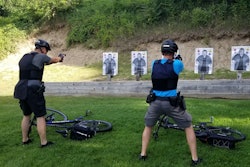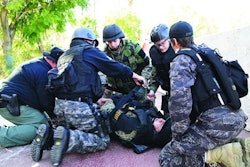"In the criminal justice system, the people are represented by two separate, yet equally important, groups: the police, who investigate crime—and the district attorneys, who prosecute the offenders.....Dun, dun!"
The now-familiar introduction to the long-running TV show "Law and Order"—including its sound-effect punctuation mark of "Dund, dund!" or "Chung, chung!" or whatever—is entertaining fiction, but incomplete in describing the real world.
In reality, those same officers who made the arrests play a critical role in successful prosecution of the offenders. Testifying in court can for some be as easy as the breeze, but for others it's terribly uncomfortable and unsettling.
To be successful on the stand requires a certain level of confidence, which can really only be acquired through a certain level of competence, which comes from experience and training. Here are some thoughts on how to build those traits.
Doing the Preparation
Colin Gallagher—a retired Police Sergeant with the Wichita (KS) Police Department and the former Director of Safety and Security for the Wichita Area Technical College—now teaches officers how they can achieve success on the stand.
"One thing officers have to realize the defense knows probably more about the case than [the officer]. Most officers report a particular portion of the case—and that's where it stops," Gallagher says.
He adds that this can be particularly problematic when an officer also feels some sort of obligation to "win the case" with just their own testimony when "they are just one cog in a much bigger system" of brining an accused suspect to justice.
Altogether too often, officers are ill-prepared to perform at their best under cross-examination because they lack the fundamental training and necessary practice, he says.
"We talk about how to set up a proper training cycle to get officers the experience they need even before they go to the department. We do a decent job of training [recruits cadets in an academy setting] to be a police officer on the street. Some academies have a courtroom testimony portion, but it's not long enough really," Gallagher says. "It falls upon the administration to make sure they get the experience to see senior officers testify, to pick up on some of the tricks and traits of both defense and prosecution."
He explains that officers sometimes feel "attacked" because they're in courtroom and the defense attorney—doing their job and defending their clients the best way possible—sometimes force officers to become defensive on the stand.
"A jury, the judge, and so forth pick up on that," Gallagher says. "It's like playing poker—there are tells you have and you need to just learn to relax. That's all part of the training."
Gallagher suggests that preparation can be as simple as a free-form discussion with the prosecutor about the case and the expected testimony. He even recommends bringing in a defense attorney to help in preparing an officer for what they might encounter in the witness box. He also suggests that officers attend court proceedings in which they are not involved, just to observe, take notes, and learn.
"It's just like anything else we do in life. We don't just jump in a car and start driving. You learn, you practice, and then you do."
Telling the Story
Missy O'Linn—a partner in the Los Angeles office of Manning & Kass, Ellrod, Ramirez, Trester LLP—says, "Credibility and likability are foundational elements of presenting cases—that's number one for you to understand. Number two is that that, frankly, officers need to make sure that they are prepared to tell the story."
O'Linn continues, "The story starts with, quite frankly, an individual chose to be some type of threat or was having some type of crisis and you arrived there, providing what I would characterize as a concerned response. We frequently miss that in not only our report writing, but in our testimony.
O'Linn says that in reports and oral statements, the individual at the center of the call—the subject—should be characterized not as a problem to be solved but involved in a situation requiring police assistance to be made safe.
"They are someone who needs assistance to either avoid hurting themselves or hurting others," O'Linn says. "That may sound kind of like a soft approach, but the bottom line is when you approach people like they're a problem solve, they typically rebel and repel that effort to help them.
O'Linn points out that not every situation call can be resolved in this fashion, noting that "escalation requires cooperation" and that when every effort to deescalate a situation are met with resistance by the individual then legal and justifiable force must be used—and subsequently articulated during testimony.
"Once the danger is averted, we should be treating many of these situations like a medical emergency," O'Linn says. "That medical emergency requires resources to protect the individuals responding to provide that medical care... that medical emergency assistance. So when you start telling the story like that, it's much more palatable it's much more effective."
O'Linn says that officers should give some consideration every single day to talking about their actions in a courtroom setting. She's even coined a phrase about this concept that she uses when she trains officers around the country.
"Make a good movie," she says. "You only get one chance to tell your story for the first time. It's so much easier for me to present my side of the incident if I was doing my best to resolve an incident peacefully."
Finishing the Work
Testifying in court is uncomfortable—even unnatural—for many officers. Even veterans with countless closed cases and incalculable hours spent on the stand can be made to squirm in their seats when a savvy shark of a defense attorney sinks their teeth.
It is vital then, that agencies should provide officers with every opportunity to become better prepared for their "role" in the criminal justice system. This means more (and better) classroom training in the academy, top-notch in-service training on a regular basis, and case-specific pre-trial meetings and even "coaching" and/or "rehearsals" with people from the prosecutor's office.
Officers on the stand have an obligation to ensure that the good work they did to put an offender in handcuffs is not for naught if their testimony doesn't help put that same individual behind bars.
















